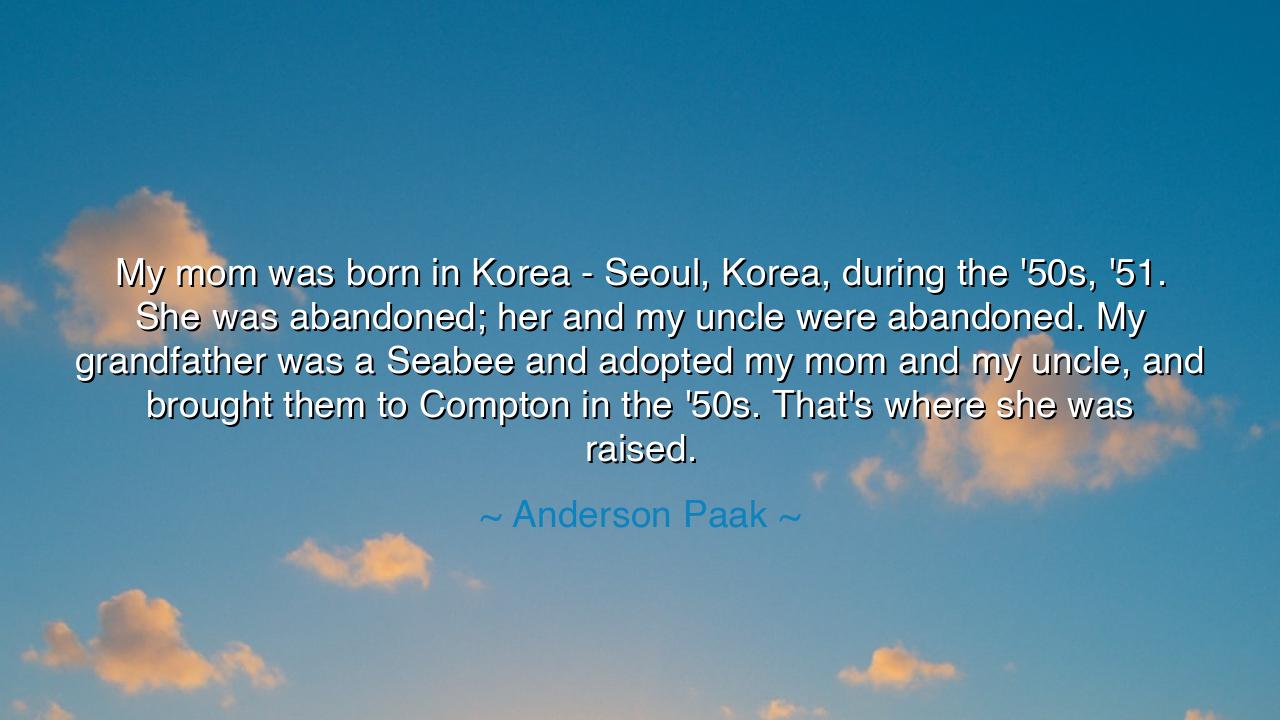
My mom was born in Korea - Seoul, Korea, during the '50s, '51.
My mom was born in Korea - Seoul, Korea, during the '50s, '51. She was abandoned; her and my uncle were abandoned. My grandfather was a Seabee and adopted my mom and my uncle, and brought them to Compton in the '50s. That's where she was raised.






The words of Anderson .Paak — “My mom was born in Korea — Seoul, Korea, during the ’50s, ’51. She was abandoned; her and my uncle were abandoned. My grandfather was a Seabee and adopted my mom and my uncle, and brought them to Compton in the ’50s. That’s where she was raised.” — echo with the weight of history and the quiet strength of survival. Beneath their surface lies a story that is not merely personal but universal: the journey from abandonment to belonging, from the ruins of war to the creation of identity in a foreign land. In these few sentences, one hears the distant thunder of conflict, the silence of loss, and the enduring heartbeat of love that chooses, adopts, and redeems.
His mother’s life begins amid the ashes of the Korean War, a time when nations were divided, and families torn apart by the machinery of history. To be born in Seoul in 1951 was to enter a world of displacement, hunger, and uncertainty. Children like her — left behind, unwanted, or orphaned — became living witnesses to the cruelty of circumstance. Yet from that very desolation came a story of adoption and renewal, for it was an American serviceman, a Seabee, who saw not strangers, but children worthy of love. In his act, we see a light that has guided humanity since its beginning: the power of compassion to defy the boundaries of blood, nation, and race.
To be abandoned and then chosen — this is the paradox at the heart of life’s greatest transformations. In the ancient tales, such stories often belong to heroes: Moses, left in a river’s current, found and raised by foreign hands, destined to lead his people to freedom; Romulus and Remus, abandoned upon the banks of the Tiber, nourished by the wild, later founding Rome itself. Anderson .Paak’s mother stands among them — a quiet, modern reflection of that timeless truth: that one’s beginning does not determine one’s worth, and that love, when offered freely, can rewrite the script of destiny.
When she was brought to Compton, she entered another battlefield — not one of bombs and guns, but of identity and belonging. The Compton of the 1950s was a crucible of change, where working-class families of every color struggled to build dignity amidst segregation and shifting tides. For a young Korean girl raised in an American household, identity was not inherited but forged. She learned to carry multiple worlds within her — the silence of Seoul, the energy of California, the resilience of her adoptive father. In her, East met West, sorrow met rhythm, and survival became song. It was from her story that Anderson himself drew the rhythm of his own music — the blend of soul, funk, and grit that speaks to all who have ever lived between worlds.
Her life, then, is a living parable of adoption as creation — not the erasure of the past, but the making of a new future. The Seabee who brought her home did more than rescue two children; he planted seeds of generations yet unborn. Through his compassion, the pain of one era was transformed into the art of another. Anderson’s voice — rich, searching, full of joy and ache — is the echo of that transformation. The bloodline of love does not always flow through veins; it often flows through actions, through the willingness to open one’s arms to those the world has cast aside.
The story also reminds us that history lives not only in nations and wars but in the lives of families — in the quiet decisions that change the course of time. His mother’s survival was not recorded in textbooks, but it shaped an artist whose work now moves millions. Such is the way of life: one act of compassion, buried in the ordinary, can ripple outward for centuries. It teaches us that greatness is not born only from privilege or power, but from the courage to choose kindness when surrounded by chaos.
From this tale, we must learn the eternal lesson of resilience and redemption. No beginning is too broken to birth beauty. No abandonment too final to prevent belonging. The hands that lift another — as his grandfather lifted two children from the ruins of war — perform the most sacred labor known to humanity. And those who are lifted, like Anderson .Paak’s mother, carry within them a wisdom that can never be taught: that love is not given to us because we deserve it, but because someone chooses to see us as worthy of it.
So let these words be passed to future generations: never forget the power of compassion, and never underestimate the strength of those who have survived being left behind. For from such lives are born the artists, the dreamers, and the healers — those who remind the world that out of war can come music, out of loss can come family, and out of abandonment can rise the most unbreakable kind of love.






AAdministratorAdministrator
Welcome, honored guests. Please leave a comment, we will respond soon